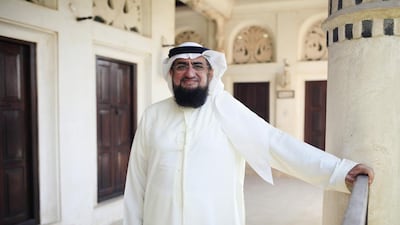ABU DHABI // Some were sceptical that Rashad Bukhash would win a seat on the Federal National Council when he announced his candidacy.
The engineer who heads the architectural heritage department at Dubai Municipality believed otherwise.
“I think there are two reasons I won the FNC elections,” says Mr Bukhash, 53. “The first is because I volunteer at several places, like Dar Al Ber society.
“These places are close to nationals because they serve people. And the way you deal with others plays a role.”
As chairman of the UAE Architectural Heritage Society in Bastakiya, which thanks to his efforts is home to some of the best examples of preservation, he also gained popularity.
“A lot of the candidates were young,” says Mr Bukhash.
“The more established ones in the society had a bigger chance of winning.”
Although he is quiet by nature, standing out in a crowd became the norm for Mr Bukhash, who in 1991 became one of the first civil volunteers in the Armed Forces.
In 1998, when the Dubai Government Excellence Award was launched, he was honoured in the best government employee category. He was honoured again in 1999.
Before joining the council, Mr Bukhash had helped to preserve 124 historical buildings across the country and completed more than 300 engineering projects.
He is now working on registering Dubai Creek as one of the wonders of the world, arguing that it brought together civilisations – the oldest documented example being in the 15th century when Venetian merchants travelled there to buy pearls.
Already on the Unesco world heritage list are Al Ain’s Hafeet, Hili, Bida bint Saud and oasis areas.
Although his presence is often overshadowed by his bolder peers, Mr Bukhash has not let his reserved nature hold him back.
On the very first session, he joined a fellow Dubai member in calling for a temporary committee to tackle unemployment among Emiratis.
Mr Bukhash says he is motivated by the promises he made to people. Tucked away in his wallet since the day he won election is a list of goals centred on national needs.
Another promise is to preserve the country’s heritage. The matter was brought up last year when Sheikh Nahyan bin Mubarak, Minister of Culture, Youth and Community Development, was summoned to answer why a law to protect historical sites was delayed.
“The council’s work is political and diplomatic,” Mr Bukhash says. “My work outside the council is very different but it was a great experience. I learnt a lot from it.”
Even with the struggle of coping with his dual roles, Mr Bukhash would not mind a second term.
However, some changes he would like to see included increasing the number of seats in the council to allow greater representation.
In order to avoid struggles encountered in the first year, he would like to see more of the council’s former members reappointed.
“I think the experience you get from being in the FNC is great,” Mr Bukhash says. “In parliaments like the United States, a member might be a member for a very long time.
“It would be good to allow old members to stay on since then they are experienced with the council. We faced difficulty [in 2011] because we were all new.”
osalem@thenational.ae

